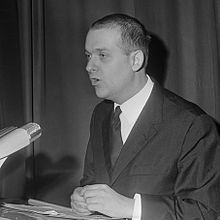Jan Němec
| Jan Němec | |
|---|---|

Jan Němec in 1967
|
|
| Born |
12 July 1936 Prague, Czechoslovakia now Czech Republic |
| Died | 18 March 2016 (aged 79) |
| Occupation | Director |
| Years active | 1960–2016 |
| Spouse(s) |
Ester Krumbachová (m. 1963–68) Marta Kubišová (m. 1970–73) Veronica Baumann (m. 1984–2003) Iva Ruszelakova (m. 2003–16) |
| Children | 1 |
Jan Němec (12 July 1936 – 18 March 2016) was a Czech filmmaker whose most important work dates from the 1960s. Film historian Peter Hames has described him as the "enfant terrible of the Czech New Wave."
Němec's career as a filmmaker started in the late 1950s when he attended FAMU, the most prestigious institution for film training in Czechoslovakia. At that time, Czechoslovakia was a communist state subservient to the USSR, and artistic and public expression was subject to censorship and government review. However, thanks largely to the failure of purely propagandist cinema in the early 1950s and the presence of important and powerful people such as Jan Procházka within the Czechoslovak film industry, the 1960s led to an internationally acknowledged creative surge in Czechoslovak film that became known as the Czech New Wave, in which Němec played a part.
For graduation, Němec adapted a short story by Arnošt Lustig based on the author's experience of the Holocaust. Němec would return to Lustig's writing to direct the influential film Diamonds of the Night (1964), also based on the Holocaust. That film follows the fate of two boys who escape from a train taking them to a concentration camp. It is noted for its dramatic subjectivization of the experience of the Holocaust using experimental techniques including flashbacks, simulated hallucinations, and an unusual double ending that leaves the viewer in doubt as to the fate of its protagonists. It was his first major success, and while it passed the censors' reviews, it helped lay the foundation for the political movement that was coming. The film has since been called an aesthetic and technical milestone in the exploration of human experience under extreme conditions.
His best known work is A Report on the Party and the Guests (1966). Its plot revolves around a group of friends on a picnic who are invited to a bizarre banquet by a charismatic sadist, played by Ivan Vyskočil, who eventually bullies most of them into blind conformity and brutality while those who resist are hunted down. The film received a particularly bad reception from the authorities as Vyskočil in the film had a remarkable likeness to Lenin, though according to Peter Hames this was accidental. Moreover, the cast consisted of various dissident Czechoslovak intellectuals of the day, including Josef Škvorecký. The film was viewed as being so subversive to the Communist state that Antonín Novotný, the president, was said to "climb the walls" on viewing it and Němec's arrest for subversion was considered.
...
Wikipedia
